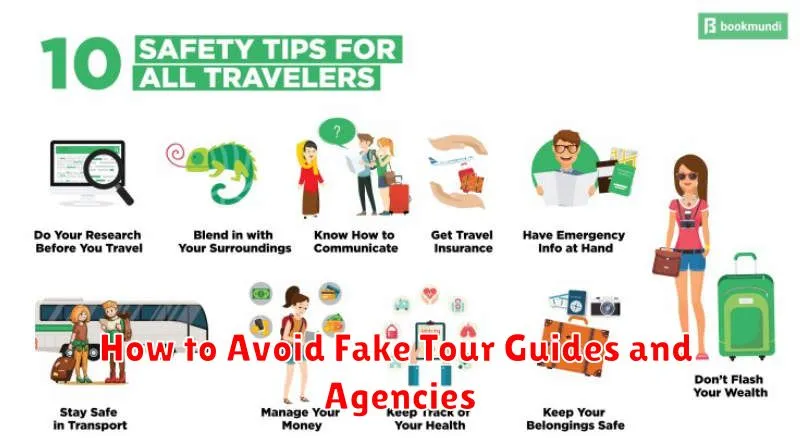Planning your dream vacation? Don’t let it turn into a nightmare by falling prey to fake tour guides and fake tour agencies. Protecting yourself from these travel scams is crucial for a safe and enjoyable trip. This article provides essential tips on how to avoid fake tour guides and how to identify fake tour agencies. Learn how to spot the red flags, conduct thorough research, and verify credentials to ensure a legitimate and memorable travel experience. From checking online reviews and verifying licenses to understanding local regulations and trusting your instincts, we’ll equip you with the knowledge to navigate the world of tour operators confidently. Don’t risk your money and safety; learn how to avoid travel scams and make informed decisions.
Fake tour guides and fake tour agencies can ruin your trip with overpriced services, hidden fees, unsafe practices, or even outright theft. Learning how to identify fake tour agencies and avoid fake tour guides is paramount to a successful vacation. This article offers practical advice on how to spot a fake tour guide and verify the legitimacy of a tour agency. We will cover essential steps, such as checking for online presence, verifying licenses and certifications, reading reviews from previous travelers, and understanding local tourism regulations. Empower yourself with the information you need to avoid travel scams and ensure a positive and authentic travel experience.
Risks of Hiring Unverified Guides
Engaging unverified guides presents significant risks to your safety and overall travel experience. Safety is paramount, and unverified guides may not be properly licensed or trained, potentially leading to dangerous situations.
Financial risks also exist. Unverified guides might overcharge, demand unexpected payments, or even be involved in scams. Your personal belongings could be at risk as well. Finally, an unpleasant experience with an unqualified guide could severely impact the enjoyment of your trip.
Checking Licenses and Reviews
A crucial step in verifying a tour guide or agency’s legitimacy is checking for proper licensing. Legitimate operators will have the necessary permits and certifications from relevant tourism authorities. Contact your local tourism board or regulatory bodies to confirm the validity of a license.
Online reviews and testimonials provide valuable insights into past travelers’ experiences. Consult reputable travel review platforms and forums to gauge the guide or agency’s reputation. Look for consistent positive feedback concerning professionalism, safety practices, and the accuracy of advertised services.
Using Trusted Booking Platforms
One of the most effective ways to avoid fake tour guides and agencies is to utilize reputable booking platforms. These platforms often have vetting processes in place to verify the legitimacy of listed guides and agencies.
Look for platforms with transparent review systems. Reading reviews from previous customers can provide valuable insights into the quality and reliability of a particular guide or agency. Prioritize platforms that offer secure payment gateways and clear cancellation policies to protect yourself in case of unforeseen circumstances.
Meeting Guides in Safe Locations

To minimize risks associated with fraudulent tour guides, always arrange meetings in safe, public locations. Avoid secluded areas or meeting at the guide’s private residence.
Recommended meeting places include hotel lobbies, designated tourist information centers, or well-known landmarks. This ensures greater security and provides options for assistance if needed.
Inform someone trustworthy of your meeting plans, including the guide’s details and the intended location. This added precaution provides an extra layer of security.
Avoiding Prepayment in Cash
One crucial strategy to avoid fraudulent tour guides and agencies is to be wary of large cash prepayments. Never pay the full amount upfront, especially in cash. This leaves you with little recourse if the service isn’t delivered.
Consider using a credit card or a secure payment platform for transactions. These methods offer better protection and a way to dispute charges if something goes wrong.
If a guide or agency insists on a substantial upfront cash payment, this should be considered a major red flag and you should reconsider using their services.
Spotting Pressure Tactics and Upsells
Pressure tactics are a red flag. Be wary of guides or agencies employing phrases like “last chance,” “limited spots,” or “selling out fast.” These are often ploys to rush your decision-making and bypass thorough research.
Upsells are common. While some are legitimate, be cautious of excessive add-ons presented aggressively. Question their value and consider whether they align with your interests. A reputable agency will respect your choices and not push unnecessary extras.
Reading Tour Details Carefully
Thoroughly reviewing tour details is crucial to avoiding scams. Pay close attention to the itinerary, noting specifics like accommodation details, included meals, and transportation methods. Vague descriptions are a red flag.
Scrutinize the pricing. Unusually low prices should raise suspicion. Understand what is included and what constitutes an extra cost. Look for hidden fees.
Research each element independently. Look up hotels and transportation options to verify their legitimacy and compare pricing. This can help identify discrepancies that may indicate a fraudulent offering.

